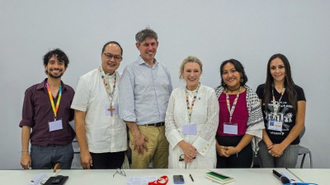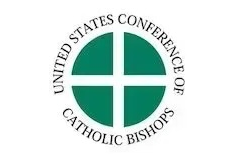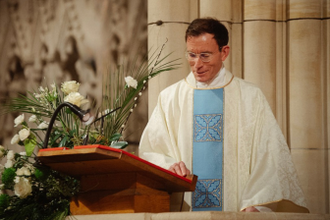Caritas at COP30: Hope is a choice

Alistair Dutton (centre) with speakers at the Caritas Internationalis panel at COP30, Credit: Vatican News
Source: Vatican News
Caritas representatives from over 40 countries have been in Brazil for COP30, urging world leaders to place human lives above political interests as the climate crisis deepens from the Philippines to the Sahel. True to its mission, Caritas Internationalis is present across the globe to respond to man-made and natural catastrophes and crises across the world. It truly is everywhere.
At COP30 in Brazil, it took that mission a step further thanks to the advocacy and witness of Caritas representatives who brought the voice of the people they serve to the global stage. Caritas' worldwide presence was made evident during their panel at COP30, in which representatives and guests spoke about the devastating typhoons striking the Philippines, and in which they placed survivors and frontline responders at the centre of the conversation.
This was evident at the close of a meeting with three cardinals from the Global South, who had presented a document urging negotiators to put human lives - rather than political interests - at the heart of the COP30 process. After the meeting, Alistair Dutton, Secretary-General of Caritas Internationalis, invited participants to sign a petition he had just delivered to COP30 leaders. He told Vatican News that the petition, already endorsed by 200,000 people and 200 organisations worldwide, contains "very specific recommendations that we must act on quickly if we are to help people escape the debt crisis they're facing."
COP30, like others before it, has been dominated by the question of finance. Pope Leo, and Pope Francis before him, have repeatedly called for the countries of the Global North to consider releasing those of the Global South from crippling debt - a plea that Dutton echoed at a time in which the timeline to meet the Paris Agreement targets has dwindled to nearly nothing; meanwhile, aid budgets are being slashed, even as the effects of climate change worsen. "More than 50 countries spend more on debt repayments each year than on health, education, and public services combined," he said. "They are pouring money out of their own countries instead of being able to spend it on their own people."
From debt to displacement, the consequences of climate change appear in different forms across the globe, but they share one heartbreaking thread: they strike first - and hardest - those who have done the least to cause them. Dutton spoke of three simultaneous super cyclones in the Philippines; of videos arriving daily from Jamaica, where Caritas teams deliver aid in darkness because electricity has failed; of devastating food crises across the Sahel, Malawi, and Zambia; of Pacific islands like Kiribati, where only the stumps of former homes remain as the sea advances. "I don't think there is a country in the world anymore that isn't facing dramatic weather conditions," he said.
And as we look at the victims of climate change, we cannot help but think of the victims of conflict. "Climate change and conflict are intrinsically linked," Dutton explains. As resources become scarcer, competition grows: between herders and farmers, between communities sharing river basins, even between nations. The example of Ethiopia and Egypt struggling over water rights is only one among many. "It often begins with a changing circumstance: when land becomes inhospitable, when people are forced to move," he said; "and with movement comes friction, and with friction, conflict."
Yet even as he described these overwhelming crises, Dutton turned again to the theme chosen for this Jubilee Year: Hope. It is not naïve optimism, he stressed, but a determined, stubborn hope, rooted in the countless small actions carried out daily by Caritas teams worldwide. "With all of the news we hear, it is very easy to become overwhelmed," he admitted. "But we have to hold on to those glimmers of hope - the actions moving in the right direction, the opportunities, the concrete work happening every day to help people adapt despite the odds." Caritas, along with other Catholic organisations, tries "to bring that moral teaching, that moral voice, into the room," he explained; "to appeal to the hearts of people, so that they do what we already know in our heads we need to do."
And alongside the moral dimension lies the undeniable weight of numbers: 1.4 billion Catholics, and - more broadly - 85% of the world belonging to a faith tradition. For Dutton, this is not about religious influence but about reminding leaders that their decisions must reflect the values and realities of the vast majority of humanity. "Whichever faith you come from," he noted, "we all arrive at largely the same conclusions, and it's important that the voice of faith - Catholic, yes, but alongside many others - is present, saying: this matters to all of us."
That is why, Dutton stressed, the current negotiations must be pulled away from narrow national interests and centred again on people - especially those most vulnerable. "We need an economy that serves people," he insists, "not people serving the economy."
Hope, he said, is a choice. And it is one the Church must continue to make, loudly and relentlessly. "We cannot grow in despair," he concluded. "We must keep pushing for a better world. Because it is possible."
LINK


















